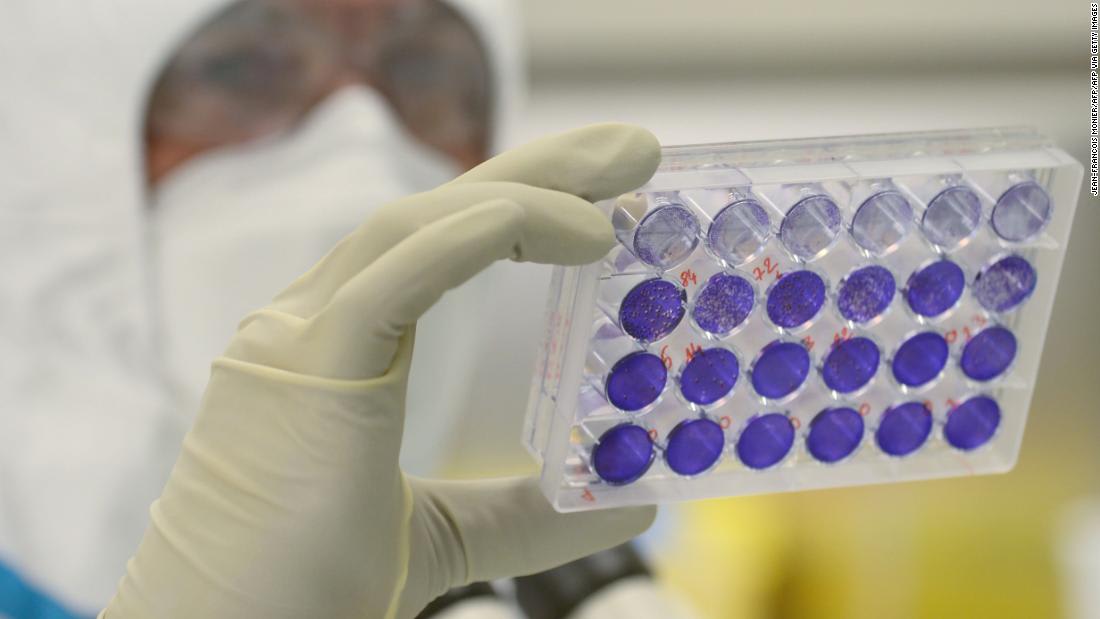Los Angeles mayor says he would have acted on coronavirus sooner if he knew what Trump knew
From CNN's Alison Main
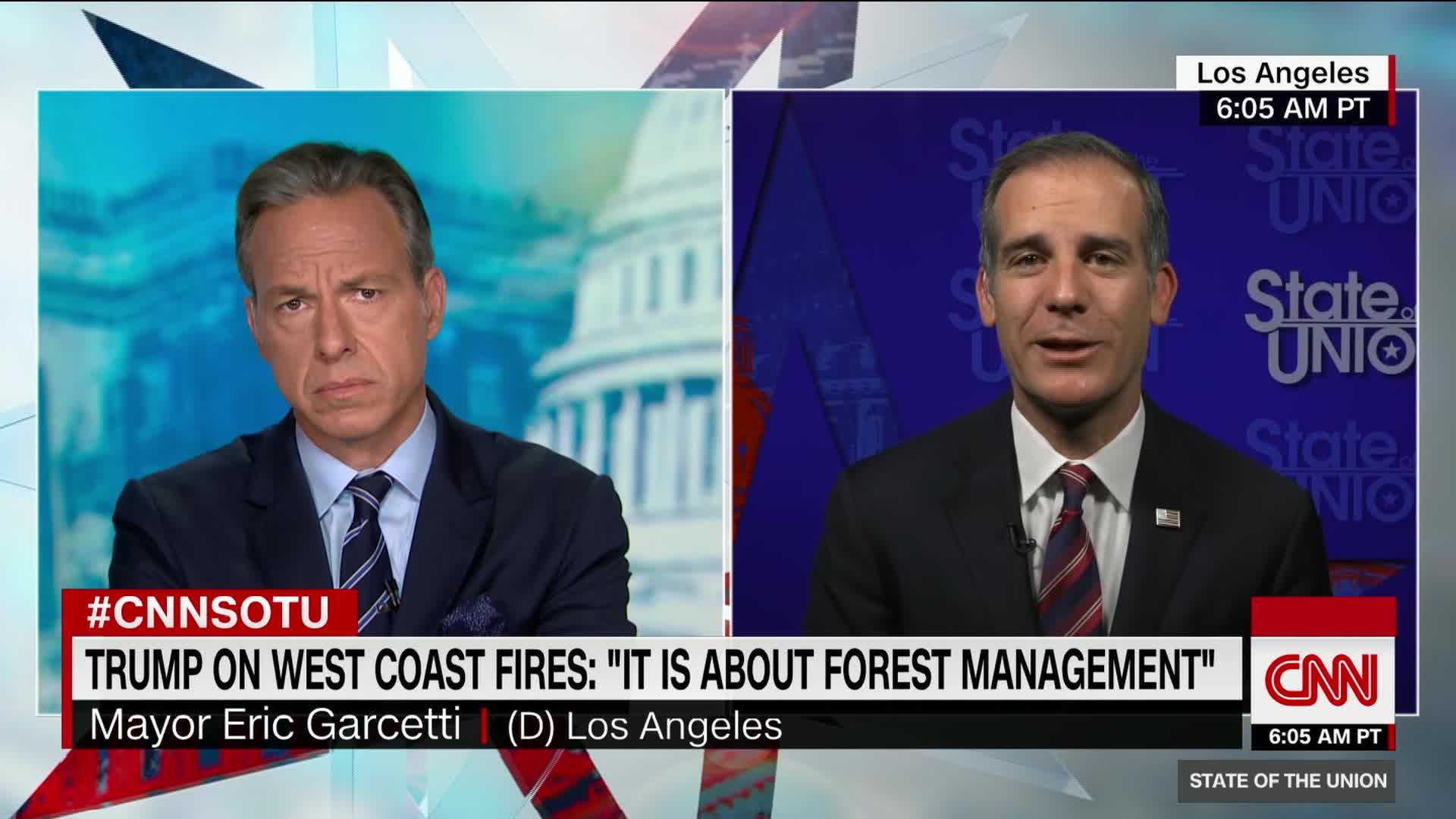
In an interview with CNN today, Los Angeles Mayor Eric Garcetti said that he "unquestionably" would have acted sooner against the coronavirus if he had known what President Trump knew in early February, as detailed in Bob Woodward's upcoming book.
Here's the exchange:
You issued your first stay-at-home order more than a month later, March 19. Do you think, if you had known in early February what we now President Trump knew, you would have acted sooner?"
GARCETTI: "Unquestionably.
And, look, you put it great in the opening. This was a rough week for the President, because he's failing on the basics, the basics of supporting our troops, the basics of responding to a fire, the basics of managing the worst health pandemic that we have had.
We were the first city to close things down, the first city to offer widespread testing. But we had to go it alone. And we heard that consistently. That's up to the states. That's up to the local governments.
I had firefighters providing tests to people, volunteers who would give their time because we had no leadership at the national level.
And, yes, if we had known and had leadership that didn't say, calm, but actually allowed us to do the work and provided us the resources to do so, we would have taken action much earlier, and thousands of lives in my city and, obviously, maybe tens of thousands, if not 100,000 lives in America could have been saved."
India's parliament to resume as coronavirus cases increase
From CNN's Rishabh M Pratap
India's parliament will resume its work on Monday amid increasing coronavirus numbers in the country.
As per the notification released by authorities, Lok Sabha (the lower house) and Rajya Sabha (the upper house) will begin the monsoon session on Monday with various Covid-19 protocols. The session will end on Oct. 1.
Every member of the Parliament along with his or her immediate family members and support staff will have to undergo testing for Covid-19 within 72 hours before the commencement of the session on Monday, the notification said. Only those members who will have a negative report for all tested in family and staff members will be allowed to attend the session.
The timings for the sitting of both houses have also been changed, the notification added.
To minimize Covid-19 transmission risks due to multiple handling of papers, all parliamentary papers will be available electronically for the members and instead of biometric, attendance will be marked using a mobile application developed by India's National Information Centre, the notification added.
As per the official data, India has recorded a total of 4,754,356 coronavirus cases including 78,586 deaths since the pandemic began.
White House trade adviser defends Trump's handling of the pandemic
From CNN's Alison Main
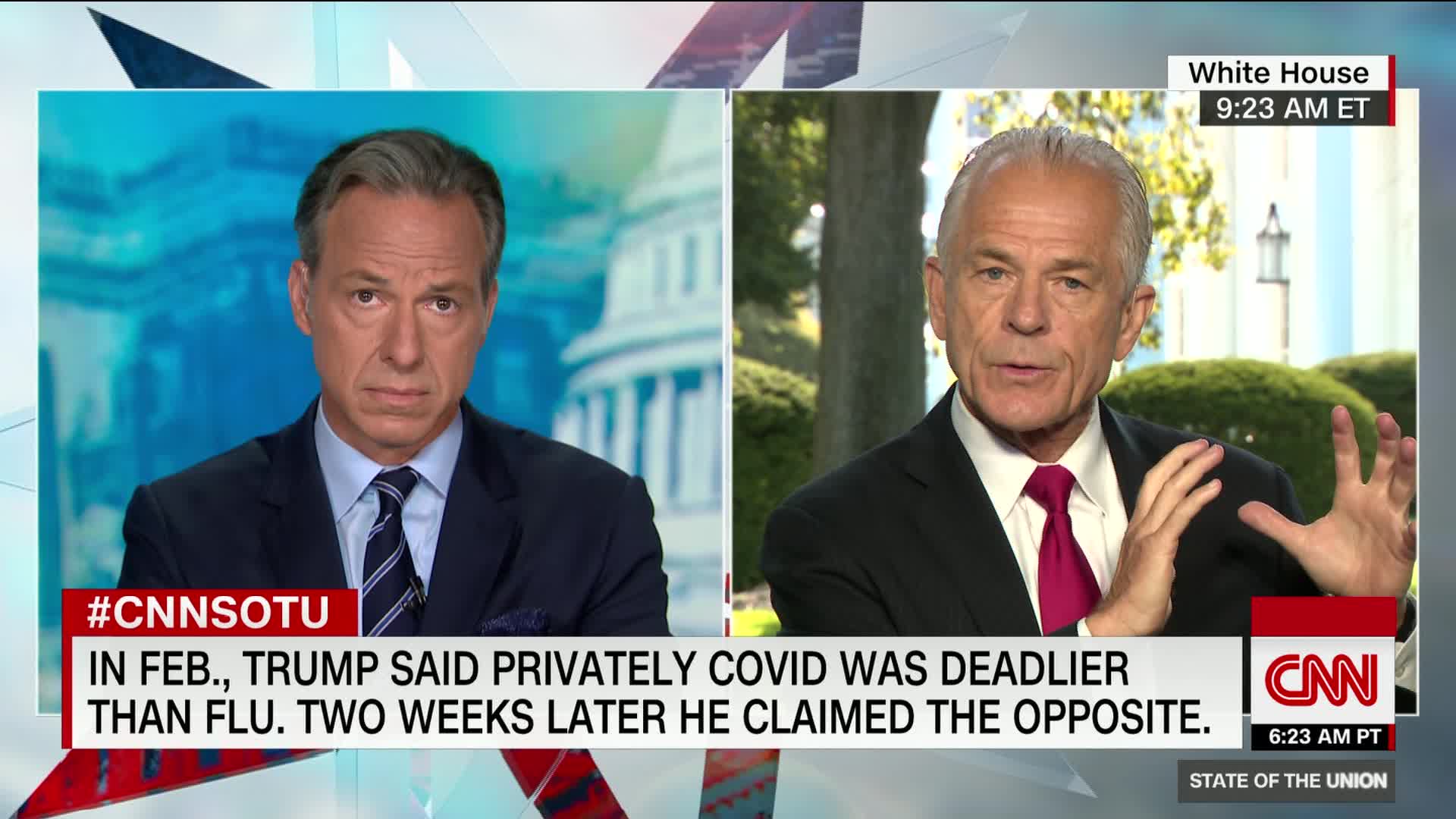
White House trade adviser Peter Navarro defended President Trump's handling of the coronavirus pandemic amid revelations from journalist Bob Woodward's upcoming book detailing the President's efforts to downplay the virus in its early stages.
When asked about the audio tape of Trump's comment in early February to Woodward about the virus being more deadly than the flu, yet denying this two weeks later in a White House briefing, Navarro hailed the President for halting travel to the US from China in what he called "a signal" from Trump that "this is a serious, serious matter."
Navarro had privately warned White House officials early about the seriousness of the virus. He pointed to a memo he said he wrote on Feb. 9 saying, among other things, that the US could have a vaccine by the end of the year "if we start right now." He said he wrote this "under the advice of the President in terms of getting on this situation because it might be serious."
Navarro claimed that in the early days of the pandemic, the US was in the "fog of war" and alleged there were "competing views as to whether this is simply the flue or whether this is very serious" at the time, despite the President's own comments, which were recorded on tape by Woodward.
Ohio State University cancels spring break in 2021 over coronavirus concerns
From CNN’s Kate Trafecante
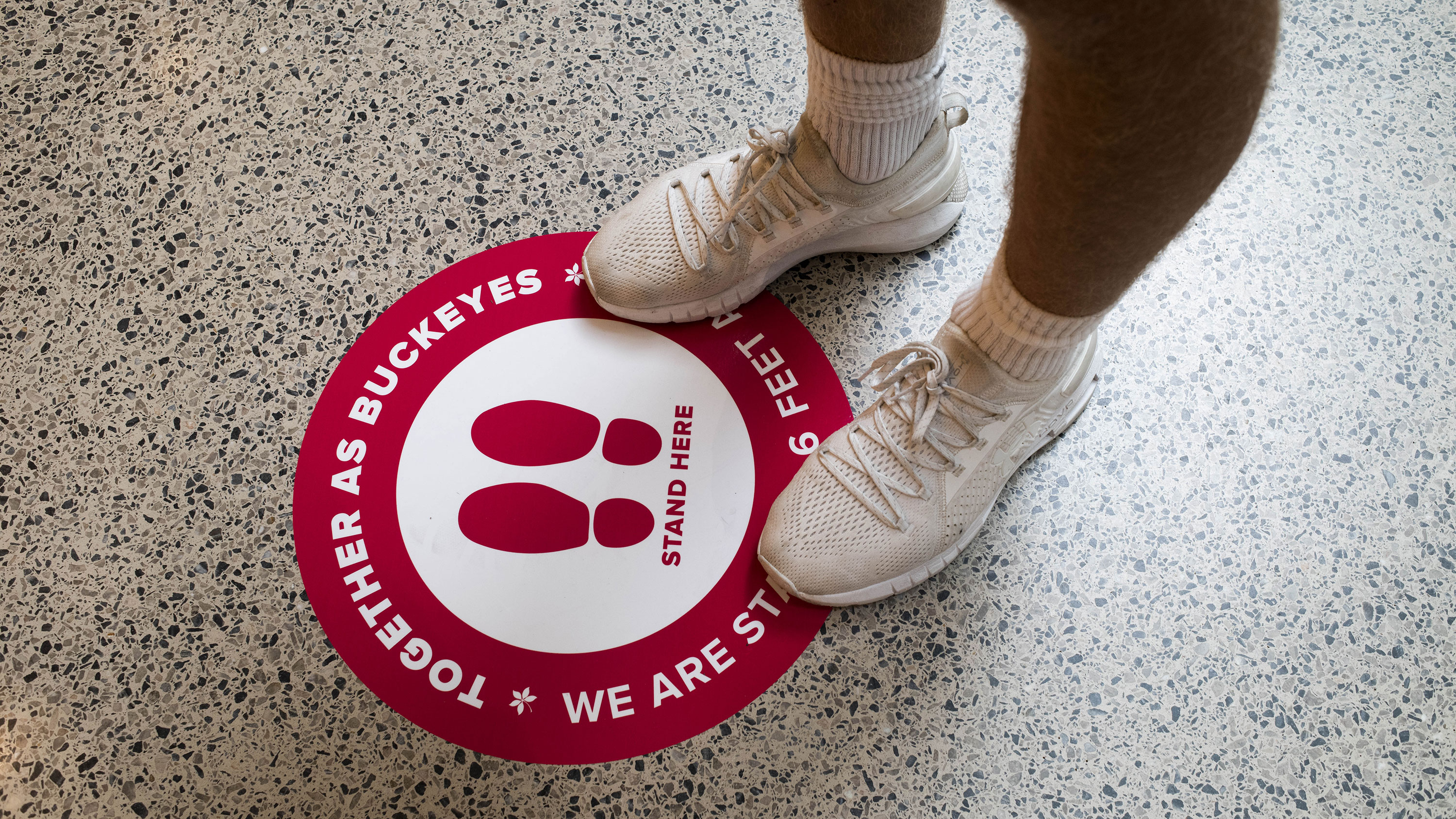 A student stands on a socially distancing marker while waiting in line inside the Thompson Library on the first day of classes at Ohio State University in Columbus, Ohio, on August 25. Ty Wright/Bloomberg via Getty Images
A student stands on a socially distancing marker while waiting in line inside the Thompson Library on the first day of classes at Ohio State University in Columbus, Ohio, on August 25. Ty Wright/Bloomberg via Getty ImagesOhio State University plans to cancel spring break next year to reduce the exposure of its students, faculty and staff to coronavirus.
Instead of the traditional spring break, there will be two days without classes on Feb. 9 and March 31, according to an email from executive vice president and provost Bruce A. McPheron to students and faculty.
The university said this will "keep our community together throughout the semester and reduce travel-related exposures."
The first week of classes of the second semester, beginning Jan. 11, will also entirely be online to give students time to quarantine before any in-person classes. Ohio State classes currently operate through a mix of in-person and online sessions, the university said.
What the numbers look like: Between Aug. 14 and Sept. 10, there were 2,097 students and 28 employees who tested positive for coronavirus, according to the university.
Here's what emergency use authorization means
From CNN's Sanjay Gupta and Andrea Kane
With talk of a Covid-19 vaccine candidate heating up, you might have heard the term emergency use authorization — or EUA — all over the news lately. But what is it exactly, and how does it apply to vaccines?
Emergency use authorization is what its name suggests: a medical product that gets special authorization by the US Food and Drug Administration to be used during an emergency. Sometimes it's a product that has already been FDA-approved, but for another condition, and sometimes it's a new product that hasn't yet received the agency's green light.
There is a lot of ongoing concern and debate about whether any vaccine candidate should be granted an EUA — or outright approval — without first completing phase 3 clinical trials.
During the Covid-19 pandemic, the FDA has granted EUAs many times to a wide range of medical products, such as ventilators; personal protective equipment, including masks; molecular and antigen tests to diagnose Covid-19, and serologic tests to look for antibodies; and even treatments, such as remdesivir and convalescent plasma.
Iran tops 400,000 Covid-19 cases
From CNN's Ramin Mostaghim in Tehran
Iran registered 2,089 new Covid-19 cases on Sunday, bringing the total number of infections across the country to 402,029, according to data from the Health Ministry registered.
The ministry also reported 128 new Covid-19 deaths, bringing death toll to 23,157.
Iran was one of the first countries to be badly hit by the virus. At one point it was among the countries with the highest case counts globally.
What to expect from the first NFL Sunday since the coronavirus pandemic
From CNN's Allen Kim
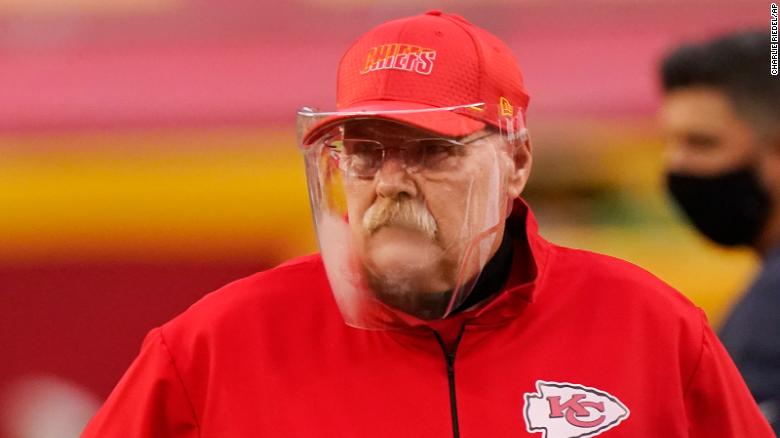 Face shields such as the one Chiefs coach Andy Reid wore on opening night could be a regular sight on sidelines this season.
Face shields such as the one Chiefs coach Andy Reid wore on opening night could be a regular sight on sidelines this season.It's the first NFL Sunday of the season, which typically signals the start of tailgating, fantasy football trash talk and Scott Hanson of "NFL Red Zone" gracing your television screen.
However, things will be very different this year.
There will be no fans in most stadiums to start the year, and you may not see some of your favorite players suit up due to the pandemic.
There were some doubts that the NFL would be able to kick off its season as scheduled due to the pandemic, but the league was able to get through training camp and start the season as planned on Thursday night.
While the league plans to play out the season as scheduled, things could quickly change with thousands of new coronavirus cases still being reported across the US.
For a full-contact sport like football -- in which it's virtually impossible to avoid being close to others, even under the strictest guidelines -- it is all but certain more players will test positive for the coronavirus, experts say.
Read more about what to expect from this extraordinary season here.
Months after infection, patients report breathing difficulty, excessive fatigue
From CNN's Ryan Prior
It's been five months since Lucy Gahan contracted Covid-19, and her life still hasn't returned to normal.
Gahan, a clinical psychologist in Shrewsbury, United Kingdom, hasn't been able to return to work.
The disease causes what she calls "storms," disabling periods when she feels shortness of breath, numbness in her hands and feet and her heart rate shoots up from simple tasks. Even taking a shower is possible only during an occasional respite in symptoms.
"In May and June, I could barely talk because I was so ill," she said.
Before contracting the disease in early April, the mother of two ran three times a week and had a regular yoga routine.
"I can only walk as far as the corner," she said. "In terms of running, I can't imagine when that will happen, if ever."
She is one of thousands around the world for whom Covid-19 has turned into a chronic condition. Gahan and other Covid-19 "long haulers" feel they aren't yet getting recognition for an illness that has disabled them for months, with no end in sight.
South Korea lifts some restrictions in Seoul
From Yoonjung Seo in Seoul
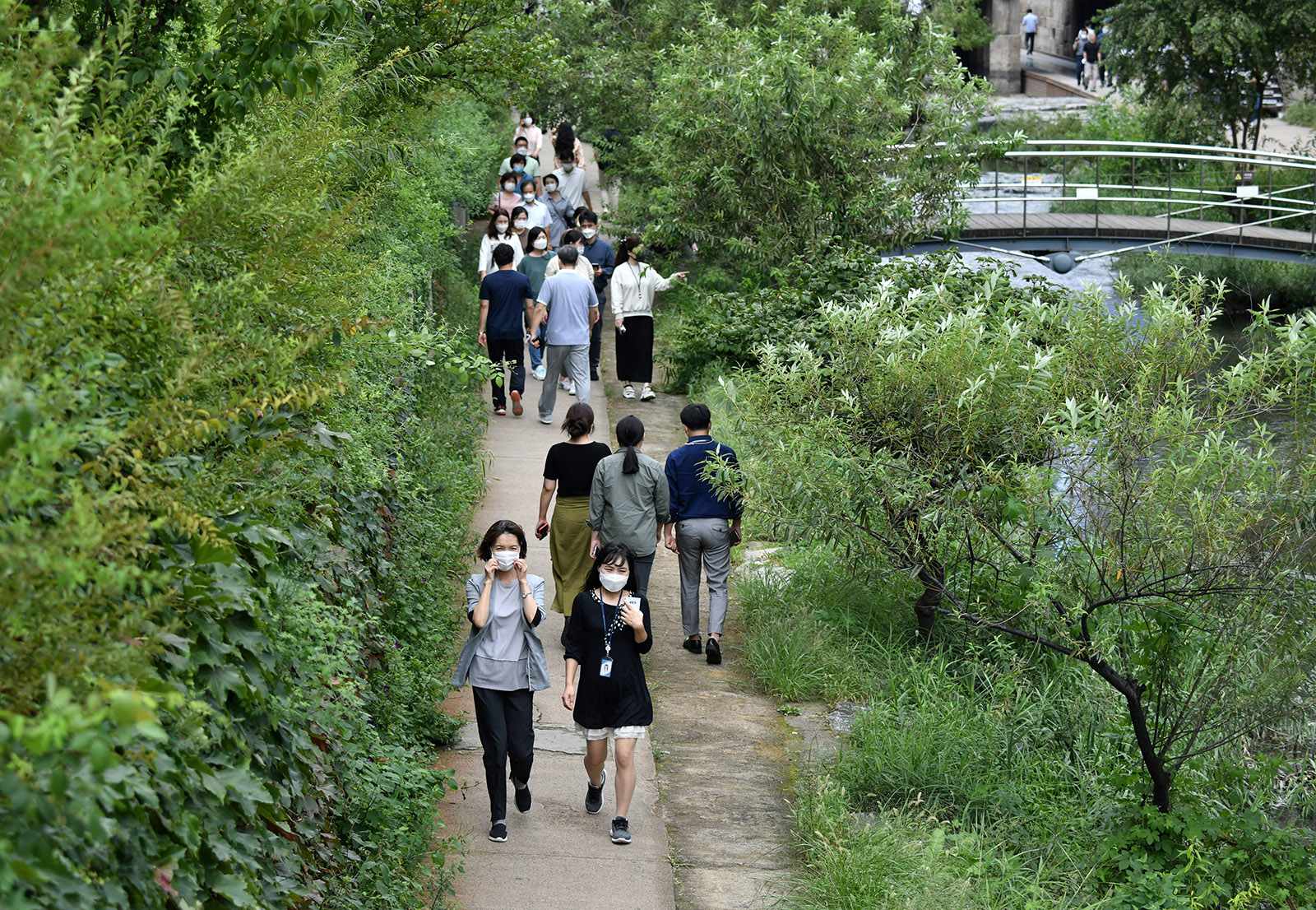 People wearing face masks walk along the Cheonggye stream in Seoul, on September 11, 2020. Jung Yeon-je/AFP/Getty Images
People wearing face masks walk along the Cheonggye stream in Seoul, on September 11, 2020. Jung Yeon-je/AFP/Getty ImagesSouth Korea will ease the strict social distancing measures imposed in the greater Seoul Metropolitan area, returning to a looser regime, the South Korean Prime Minister Chung Sye-kyun said on Sunday.
The strict measures have been in place since August 30 and were due to expire this Sunday.
The government has decided to adjust the measures to level two for two weeks until September 27. The new regime will see franchise cafes and ice cream shops able to provide sit-in services again. Restaurants and bakeries will no longer need to close between 9 p.m. and 5 a.m as long as they maintain precautionary measures such as keeping the log books and ensuring enough distance between tables, Health Minister Park Neung-hoo said in a briefing on Sunday.
Food and snack services and the entry of minors will continue to be banned at Internet cafes.
Under the level-two restrictions, indoor gatherings are limited to 50 people and outdoor gatherings to 100 people, Park said. High-risk facilities such as bars, clubs, singing rooms and door-to-door sales services will be unable to operate, according to the Health Minister.
South Korea reported 121 new coronavirus cases from Saturday, of which 99 are local cases, according to a statement by the South Korean Centers for Disease Control and Prevention on Sunday.
South Korea currently has 22,176 confirmed cases of Covid-19 and 358 deaths from the virus.

 5 years ago
644
5 years ago
644 